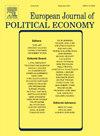Unpleasant surprises? Elections and tax news shocks
IF 2.3
3区 经济学
Q2 ECONOMICS
引用次数: 0
Abstract
Unanticipated changes in tax policy are likely to have different macroeconomic effects compared to anticipated changes due to several mechanisms. It is therefore important to understand what drives such policy surprises. We explore the nature of unanticipated tax policy changes by focusing on a political economy determinant of those events, namely the timing of elections. Using monthly data for 22 advanced economies and emerging markets over the period 1990-2018, we show that implementation lags tend to be longer for tax policy change announcements that are made during pre-election periods, thereby leading to a lower likelihood of ”tax news shocks”. We also find that implementation lags become much shorter for tax policy changes that are announced in the aftermath of elections. This pattern remains similar for different tax measures and types of taxes. The findings are robust to a number of checks, including controlling for various economic, institutional and political factors.
求助全文
约1分钟内获得全文
求助全文
来源期刊

European Journal of Political Economy
Multiple-
CiteScore
3.40
自引率
10.00%
发文量
106
期刊介绍:
The aim of the European Journal of Political Economy is to disseminate original theoretical and empirical research on economic phenomena within a scope that encompasses collective decision making, political behavior, and the role of institutions. Contributions are invited from the international community of researchers. Manuscripts must be published in English. Starting 2008, the European Journal of Political Economy is indexed in the Social Sciences Citation Index published by Thomson Scientific (formerly ISI).
 求助内容:
求助内容: 应助结果提醒方式:
应助结果提醒方式:


